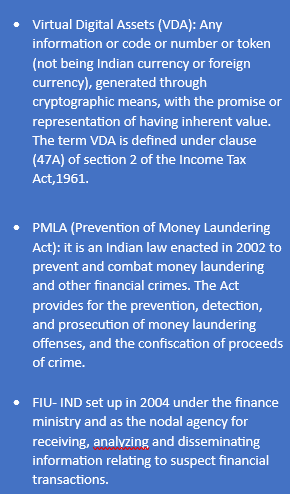- Courses
- GS Full Course 1 Year
- GS Full Course 2 Year
- GS Full Course 3 Year
- GS Full Course Till Selection
- Online Program
- GS Recorded Course
- NCERT (Recorded 500+ Hours)
- Polity Recorded Course
- Geography Recorded Course
- Economy Recorded Course
- AMAC Recorded Course
- Modern India, Post Independence & World History
- Environment Recoded Course
- Governance Recoded Course
- Science & Tech. Recoded Course
- International Relations and Internal Security Recorded Course
- Disaster Management Module Course
- Ethics Recoded Course
- Essay Recoded Course
- Current Affairs Recoded Course
- CSAT
- 5 LAYERED ARJUNA Mentorship
- Public Administration Optional
- ABOUT US
- OUR TOPPERS
- TEST SERIES
- FREE STUDY MATERIAL
- VIDEOS
- CONTACT US
VIRTUAL DIGITAL ASSETS (VDA)
VIRTUAL DIGITAL ASSETS (VDA)
01-05-2023

Latest Context
The Ministry of Finance has extended the Anti-money Laundering provisions to Virtual Digital Assets (VDA) businesses and service providers. The Ministry extended the scope of Prevention of Money Laundering Act (PMLA), 2002 by adding VDA and Crypto currency under the Act.
VDAs covered under PMLA 2002
- Exchange between Fiat Currencies and VDA.
- Virtual Digital Assets will register as a reporting entity with the Financial Intelligence Unit-India (FIU-IND).
- The International Monetary Fund (IMF) and the Financial Action Task Force (FATF) put forward the risk-mitigation measures is in line with global guidelines.
- FATF has a Virtual Asset Service Providers (VASPs) and an extensive list covering intermediaries, brokers, exchanges, custodians, hedge funds, and even mining pools.
Significance of the Move
- These rules are already applicable to financial institutions, banks and real estate markets and certain intermediaries in the securities.
- It helps in providing virtual digital assets platforms to monitor and take actions against malpractices.
- Indian virtual digital assets sector will become transparent.
- Build confidence and assurance in this and give the government more oversight on virtual digital asset transactions.
Concerns of the Move
- VDA entities could end up dealing directly with enforcement agencies like ED (Enforcement Director) without a central government.
- Many Indian VDA users have already switched from domestic exchanges to foreign counterparts and causing a decrease in tax revenues and transaction traceability. It could also reduce international investors and result in capital outflow.
Way Forward
- India should reconsider its high tax rates on virtual digital assets.
- New PMLA reduce the risks of money laundering and terror financing and align virtual digital assets taxes with other asset classes.
- Asia, South Korea and Japan established a framework to licence VASPs.
- In Europe, the Markets in Crypto-Assets (MiCA) regulation have been passed by the European Parliament.
- Crypto assets are borderless and require international collaboration to prevent regulatory arbitrage. So, any legislation for regulation can be effective only with international collaboration on the evaluation of the risks and benefits.



